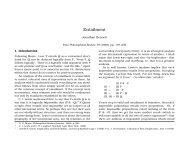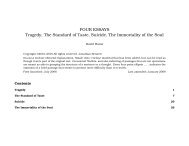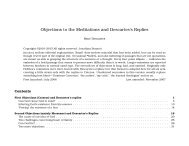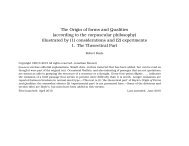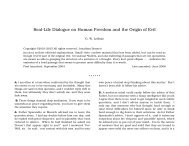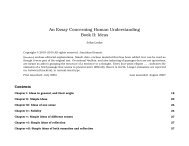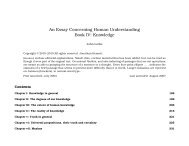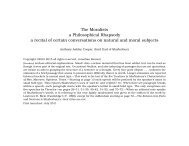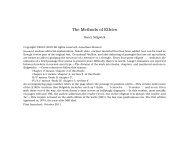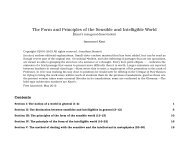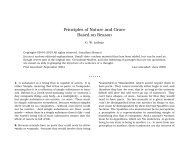A Vindication of the Rights of Woman with - Early Modern Texts
A Vindication of the Rights of Woman with - Early Modern Texts
A Vindication of the Rights of Woman with - Early Modern Texts
You also want an ePaper? Increase the reach of your titles
YUMPU automatically turns print PDFs into web optimized ePapers that Google loves.
The <strong>Rights</strong> <strong>of</strong> <strong>Woman</strong> Mary Wollstonecraft 4: The degradation <strong>of</strong> woman<br />
[Admitting that she is repeating herself, MW says that<br />
how a person thinks affects his or her character. Her present<br />
topic has been one special case <strong>of</strong> this general truth, namely<br />
<strong>the</strong> harm that women do to <strong>the</strong>mselves by spending so<br />
much time thinking about ‘<strong>the</strong>ir persons’, e.g. what sort<br />
<strong>of</strong> effect <strong>the</strong>y will have when <strong>the</strong>y next appear in public.]<br />
Women <strong>of</strong> quality [MW’s phrase] seldom do any <strong>of</strong> <strong>the</strong> actual<br />
dress-making: all <strong>the</strong>y exercise is <strong>the</strong>ir taste. And because<br />
<strong>the</strong>y think less about <strong>the</strong> finery, when <strong>the</strong> business <strong>of</strong> <strong>the</strong>ir<br />
toilet is over <strong>the</strong>y can ·put it behind <strong>the</strong>m and· be at ease in<br />
a way that is usually not open to women who dress merely<br />
for <strong>the</strong> sake <strong>of</strong> dressing. In fact, <strong>the</strong> observation that <strong>the</strong><br />
middle rank ·<strong>of</strong> society· is <strong>the</strong> one in which talents thrive<br />
best doesn’t apply to women. [If MW means her own observation<br />
on page 39, <strong>the</strong>n she isn’t quite accurate. What she referred to back<br />
<strong>the</strong>re was <strong>the</strong> well-known fact that ‘<strong>the</strong> middle rank contains most virtue<br />
and abilities’.] Women <strong>of</strong> <strong>the</strong> superior class do at least pick<br />
up a smattering <strong>of</strong> literature, and <strong>the</strong>y converse more <strong>with</strong><br />
men on general topics, so <strong>the</strong>y acquire more knowledge<br />
than <strong>the</strong> women who ape <strong>the</strong>ir fashions and faults <strong>with</strong>out<br />
sharing <strong>the</strong>ir advantages. As for virtue (using <strong>the</strong> word in<br />
7<br />
a comprehensive sense): I have seen most virtue in low life.<br />
Many poor women maintain <strong>the</strong>ir children by <strong>the</strong> sweat <strong>of</strong><br />
<strong>the</strong>ir brow, and keep toge<strong>the</strong>r families that <strong>the</strong> vices <strong>of</strong> <strong>the</strong><br />
fa<strong>the</strong>rs would have scattered; but gentlewomen are too lazy<br />
to be actively virtuous, and are s<strong>of</strong>tened ra<strong>the</strong>r than refined<br />
by civilization. Indeed <strong>the</strong> good sense I have met <strong>with</strong> among<br />
poor women who have had few advantages <strong>of</strong> education yet<br />
have acted heroically has strongly confirmed my opinion that<br />
trivial activities have made women trivial. . . .<br />
In tracing <strong>the</strong> causes that I think have degraded woman,<br />
I have confined myself to ones that universally act on <strong>the</strong><br />
morals and manners <strong>of</strong> <strong>the</strong> whole sex; and it seems clear<br />
to me that <strong>the</strong>y all arise from lack <strong>of</strong> understanding. Does<br />
this weakness <strong>of</strong> <strong>the</strong> faculties arise from physical or from<br />
accidental causes? [That is: is it causally determined by <strong>the</strong> constitutions<br />
<strong>of</strong> women as such, or is it caused by <strong>the</strong>ir circumstances?] Time<br />
alone can tell. I shan’t lay any great stress on <strong>the</strong> example <strong>of</strong><br />
a few women 7 who were given a masculine education from<br />
which <strong>the</strong>y acquired courage and resolution; I only contend<br />
that men who have been placed in similar situations have<br />
acquired a similar character. . . .<br />
Sappho, Héloise, Ca<strong>the</strong>rine Macaulay, Ca<strong>the</strong>rine <strong>the</strong> Great <strong>of</strong> Russia, Madame d’Eon, etc. These and many more can be counted as ‘exceptions’; and<br />
aren’t all heroes and heroines exceptions to general rules? I want to see women nei<strong>the</strong>r as heroines nor as lower animals, but as reasonable creatures.<br />
[Ca<strong>the</strong>rine Macaulay was a contemporary <strong>of</strong> MW’s, a much respected thinker and writer; Madame d’Eon was in fact a man who passed as a woman<br />
through most <strong>of</strong> his life.]<br />
52



